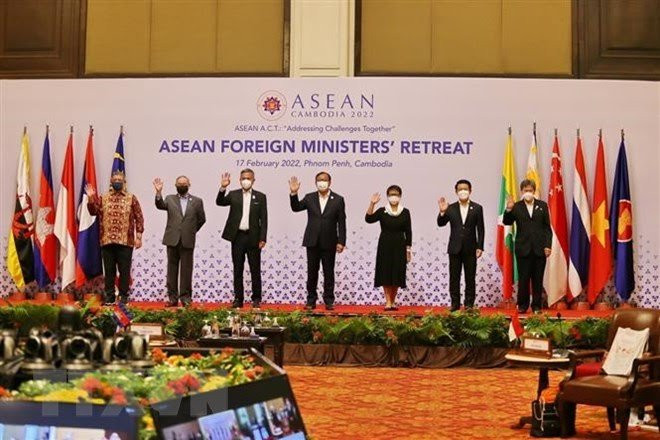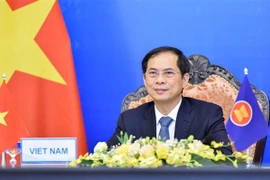 ASEAN Foreign Ministers take a photo with ASEAN Secretariat leaders and Cambodian PM Hun Sen and Minister of Foreign Affairs and International Cooperation Prak Shokhonn at the AMMR (Photo: VNA)
ASEAN Foreign Ministers take a photo with ASEAN Secretariat leaders and Cambodian PM Hun Sen and Minister of Foreign Affairs and International Cooperation Prak Shokhonn at the AMMR (Photo: VNA)Speaking at a press conference after the AMMR on February 17, he said that the ministers reiterated the significance of strengthening ASEAN economic integration and intra-bloc trade as well as investment connections and supply chains to improve the competitiveness, linkage and resilience of the region as stated in the ASEAN Economic Community Blueprint 2025.
Sokhonn said the ASEAN FMs were encouraged that the RCEP has become effective in January and reaffirmed their commitment to fully and effectively implementing the deal to enhance ASEAN's attractiveness in trade, investment and global supply chains.
RCEP was signed between 10 ASEAN members and five partners of China, Japan, Australia, New Zealand and the Republic of Korea in November 2020. With a market of about 2.3 billion people accounting for around 30 percent of the global population, RCEP is considered the current largest free trade agreement in the world. RCEP countries also make up 33.6 percent of the global GDP and 30 percent of the global trade.
Along with RCEP, the ministers also discussed measures to strengthen the region’s post-pandemic economic recovery, he said.
They also discussed the operation of the ASEAN COVID-19 Response Fund, and underlined that the timely implementation of the ASEAN Travel Corridor will create favourable conditions for cross-border activities and the enhancement of economic exchanges among member countries, he said.
Sokhonn added that the ministers exchanged viewpoints on regional and international issues, and highlighted their common commitment to the open and comprehensive multilateral mechanism based on the law to promote peace and sustainable stability inside and outside the region.
To reach this goal, the ministers agreed on the need to reinforce the central role and solidarity of the association in commitments with outside partners through ASEAN-led mechanisms to build mutual trust and construct the regional architecture with the ASEAN playing the central role, said Sokhonn./.




























